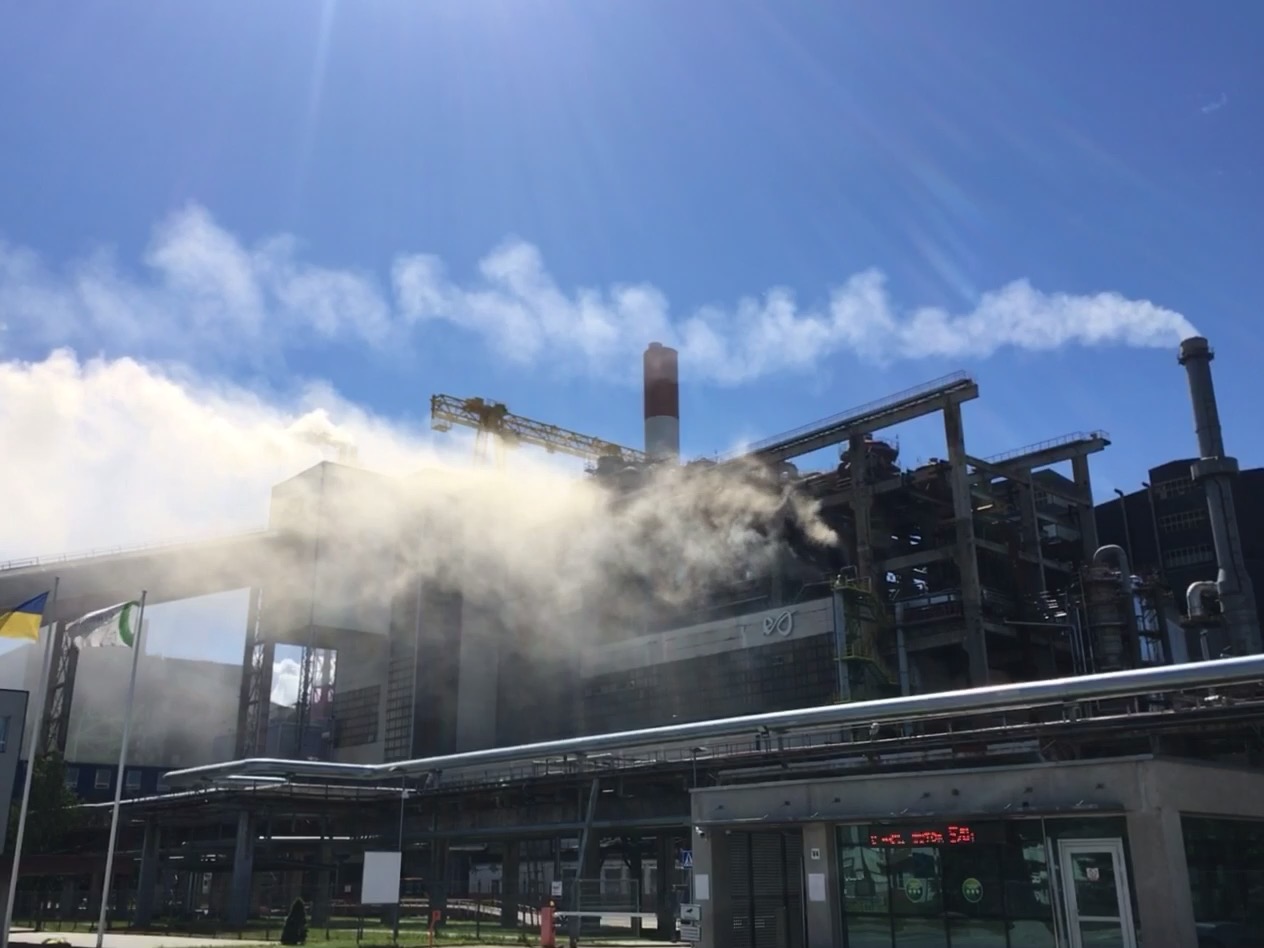
We took the shale oil plant to court again!
There is no place for new fossil fuel production in the climate crisis.
The climate crisis is caused by fossil fuels and it threatens the persistence of human civilization during our lifetime. These facts were well known in the spring of 2024, when the Estonian Environmental Board granted an integrated permit to Eesti Energia in order to operate a new shale oil plant.
Our claim is simple: To keep climate change within livable limits, fossil fuels must remain in the ground. Therefore, the Environmental Board should have refused to grant the permit.
In the summer of 2024, Fridays for Future Estonia (officially registered as MTÜ Loodusvõlu) and a young activist Elo-Lee Maran turned to court to annul the integrated permit; defend children’s rights to a liveable environment and prevent 1.6 million tonnes of greenhouse gas emissions per year.
Timeline
Why is the shale oil industry a fading industry?
- Shale oil is a very polluting fuel. Should the plant start working, Estonian carbon emissions will be increasing by 6%. Using shale oil is so polluting that only ships outside of the European Union can do it. But even freight by sea is becoming cleaner, which means that the need for shale oil will decrease.
- It provides few jobs. The new Enefit280-2 plant only needs 61 workers. As the production of shale oil is mostly automated, it does not bring a considerable amount of new jobs. That is even mentioned in the territorial plan of just transition of Ida-Viru County.
- It does not guarantee energy security. Shale oil is not produced to be used in Estonia, but rather to sell for marine fuel. As a byproduct, a small amount of electricity is produced. However, that only covers about 2% of Estonia’s peak consumption (1599 MW), thus not guaranteeing Estonia’s energy security. Furthermore, Estonia has set a goal of covering all energy use with local renewable energy by 2030.
- Investments in shale oil are non-refundable. Eesti Energia has dissipated around 380 million Euros to build Enefit280-2 shale oil plant. As the plant aggravates the climate crisis, it is not possible to earn the money back. Should the plant work until 2035, its climate impact will cost over 2 billion Euros and when including the burning of the produced oil, it will be an astounding 4.63 billion Euros, according to the European Investment Bank.
- The shale oil industry has not yet become a chemical industry. In spite of Eesti Energia’s promises that the shale oil industry will soon become a chemical industry based on circular economy, where plastic waste is upcycled; it is still only a shale oil plant. In June 2024, Enefit Power had to stop using tire shreds in oil production because the quality of the oil fluctuated. Also, at the same time, they did not have the safety certificates of the European Chemicals Agency for oil produced from tire shreds.
Construction permit lawsuit (2020-2023)
In March 2020, the municipality of Narva-Jõesuu gave Enefit280-2 shale oil plant a construction permit. By then it was more than clear that the climate crisis is a grave issue and to limit it fossil fuels have to be kept in the ground.
A month later, Fridays for Future Eesti (officially MTÜ Loodusvõlu) went to court to annul the construction permit and prevent 1.6 million tons of carbon emissions per year.
What we argued in court:
Content of the first case
The climate impact of the shale oil plant has not been considered. When establishing the zoning plan and granting the construction permit, the impact of the oil plant on climate was assessed inadequately, and the best scientific knowledge about the dangers of climate change was not considered. The carbon emissions resulting from burning the oil produced in the oil plant were not even calculated before the permit was issued. Despite the fact that the operation of the shale oil plant and burning the oil produce carbon emissions equivalent to one tenth of the emissions of Estonia, the municipality of Narva-Jõesuu did not determine whether it was legal to allow such emissions from an environmental standpoint.

Constructing the shale oil plant stops Estonia from fulfilling the Paris Agreement. By signing the Paris Agreement, Estonia committed to efforts to limit global warming to 1.5°C. As a relatively prosperous and highly developed country, Estonia also agreed to reduce its carbon emissions faster than the world average. The actions of the next decade determine whether it is possible to keep global warming under 1.5°C. However, by constructing and operating the shale oil plant, Estonia adds 1.6 million tons of carbon emissions to the atmosphere each year – or a tenth of its national emissions. That is precisely the opposite of what we should be doing. Climate change had already become a grave global threat by the spring of 2020, so the municipality of Narva-Jõesuu must have known that when it comes to limiting dangerous global warming, every shale oil plant matters.
The shale oil plant is in conflict with the UN Sustainable Development Goals. Climate change threatens people’s lives, health, and food security worldwide. As climate change intensifies, inequality increases, because the most vulnerable and marginalized people are the least protected in the face of extreme weather. In fact, one of the Sustainable Development Goals is taking urgent action to combat climate change and its impacts. Constructing the shale oil plant exacerbates climate change and thus hinders the achievement of all sustainable development goals worldwide.
The decision regarding the construction of the shale oil plant was based on outdated development documents. When granting the construction permit for the shale oil plant, the municipality of Narva-Jõesuu found – without any substantive analysis – that the plant was in line with development documents such as “The fundamental elements of Estonia’s climate policy for 2050”, “National Energy and Climate Plan 2030”, and “Estonia’s energy development plan to 2030”. However, by the time the decision was made, these documents had essentially become outdated. The fundamental elements of Estonia’s climate policy did not even include a target of climate neutrality, which is necessary to fulfil the Paris Agreement. Therefore, when granting the construction permit, it was not sufficient to rely on the fact that building the shale oil plant was in accordance with these outdated documents. Instead, the decision should have been based on Estonia’s actual obligations to combat climate change.

The decision of the Supreme Court on the building permit
The Supreme Court upheld Fridays for Future Estonia’s claim and annulled the construction permit in October of 2023. The Supreme Court gave two months to carry out essential works to ensure the safety of the oil plant before the construction is completely stopped. The Supreme Court also obliged the city government of Narva-Jõesuu to investigate the environmental effects of the previously unassessed oil plant and then to decide on granting the factory a new building permit.
The Supreme Court declared that when giving out a building permit the climate impact accompanying the use of the building must also be assessed. According to the decision of the Supreme Court, it must be compared with Estonia’s climate goals in order to determine whether the plant causes excessive greenhouse gas emissions. In a situation where no law stipulates an obligation for Estonia to reduce greenhouse gas emissions, the court found that the plant’s emissions must be compared with the goals formulated in the strategic development documents.
According to the Supreme Court’s judgement it is correct to excludethe burning of the oil from the assessment of climate impact, as Estonia’s climate goals only cover the emissions of Estonia’s territory but the oil is burned outside of the borders. The Supreme Court found that the construction and operation of the oil plant does not prevent Estonia from achieving the climate goals included in the development plans. Thus, the climate impact of the oil plant was not the reason for revoking the building permit.
The Supreme Court established that when granting the construction permit to the oil plant, the impact of climate change on the plant, the environmental impact related to phenolic water generated during the production of oil shale oil, and the plant’s impact on the Puhatu bird area, which is part of the Natura 2000 network, were not assessed. Therefore, the court annulled the construction permit of the oil factory and obliged the municipality of Narva-Jõesuu to assess these environmental effects and decide on the granting of the construction permit again.
The Supreme Court found that according to the Constitution Estonia has an obligation to restrict greenhouse gas emissions. The court relied on the IPCC report and firmly stated “that the increase in the concentration of greenhouse gases in the atmosphere contributes to global climate change and that this in turn has severe consequences for humanity”.
In addition, the Supreme Court stated that according to the constitution, Riigikogu (the Parliament of Estonia) must decide on important issues related to curbing climate change in Estonia based on the best scientific information and Estonia’s international obligations. The Constitution obliges the Estonian state to make its “proportionate contribution” to keep climate warming significantly below 2 degrees, as agreed upon in the Paris Agreement.
The Court emphasised that the risk of not being able to operate the already built plant because of its impact on the environment is the liability of Enefit Power AS. The fact that the factory is almost finished must not influence the Environmental Board to issue a complex permit to the oil factory.
To read the in-depth analysis (EST): https://k6k.ee/uudiskiri/2023/olitehas
To read the judgement (EST): https://www.riigikohus.ee/et/lahendid/?asjaNr=3-20-771/103
About us
Kohtuasi on teoks saanud tänu paljude aktivistide ja toetajate tehtud pingutustele.

Elo-Lee Maran
Elo is a high school student and activist in FFF Estonia. She personally filed a complaint to annul the integrated permit, because the plant, by fuelling the climate crisis, infringes her rights protected under the Convention on the Rights of the Child.

Kertu Birgit Anton
Kertu is a university student and a member of the board of MTÜ Loodusvõlu, the legally registered NGO of FFF Estonia. She is also the coordinator of the case.

Robert Pappel
Robert is a law student, an activist in FFF Estonia and one of the spokespeople of the case.
The youth are supported by legal experts Kärt Vaarmari and Triin Jäädmaa from the Estonian Environmental Law Center and Tambet Laasik, an attorney at law.
Support us!
The court case is costly and we are able to proceed only with the help of our supporters.
The donated funds will be used to cover the costs related to the case, mainly to obtain legal advice.
If we collect more donations than are needed for the shale oil plant court case, we will use the excess to continue advocating for the rights of people and nature.
Bank details:
Account holder: MTÜ Loodusvõlu
Account number:
EE237700771010417938
Bank name: AS LHV PANK
BIC / SWIFT code: LHVBEE22 XXX
SWIFT code (8 characters): LHVBEE22
Branch name: AS LHV PANK
Branch code: XXX
Address: TARTU MNT 2, TALLINN
Reference: keskkonnaõigus / environmental law
